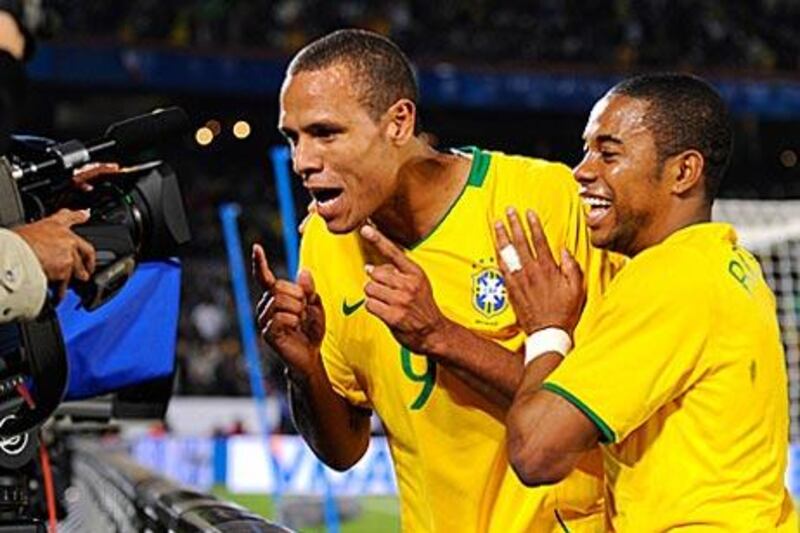Reputations are hard to shake. Especially when they're well-deserved. As a teenager, Luis Fabiano was the quintessential problem kid. Surly, sulky and prone to flashes of temper. Yes, he was talented, but at what price? There was a reason why Guarani, the biggest club in his hometown of Campinas, let him go after several years in their youth academy and he ended up at Ponte Preta, the poor relations: he was simply uncontrollable. And the word among Brazilian clubs was that this was not something he was going to outgrow.
Fortunately, the scouts from Rennes, the men who persuaded their club to part with a record £3 million (Dh16.1m) either did not know about his "issues" or thought they could resolve them. New team, new environment, new brighter and shinier outlook on life. How wrong they were. He was 19-year-old in a strange foreign land and he hated every minute. "Even the food," he would later tell Globo, the Brazilian broadcaster, prompting some to suggest that, yes, he was certifiably insane if he did not like French cuisine. He made just seven appearances in six months, without scoring a single goal and, by January, Rennes had sent him back to Brazil on loan.
The club said it felt that a stint at Sao Paulo would help cheer him up and rediscover his joy for the game. Which is pretty much what happened. Faced with the threat of having to return to Europe, he was an instant hit at the Estadio Morumbi and, when his loan spell was over, the fans begged the club to keep him on. Except Rennes' did some quick math; why sell him at a loss to Sao Paulo now that he's once-again happy and scoring goals? Why not bring him back and let him show what he can do in Europe?
Fabiano would later tell TV Globo that he cried for the entire flight back to Europe. It was obvious he did not want to be back, as evidenced by his poor performances: four appearances in six months, and, again, no goals. Now Rennes had a problem. Fabiano seemingly could not perform outside of Brazil. As long as they hung on to him, he'd be more and more difficult to sell. So when Sao Paulo came back with a £1.2m offer, they took it: best to get rid of him and cut their losses.
Thus began a love affair with Sao Paulo. In his first year back, he scored nearly a goal a game, in his second he broke the Brazilian single-season scoring record. That was enough to earn him his first caps. But, of course, there was the flipside. He no longer sulked, but he appeared, once again, impossible to control on the pitch, as evidenced by the nine red card he collected over those two seasons.
Sao Paulo, worried about his mental health, sent him to a psychologist. And, slowly, the anger management started to have an effect. The furious Fabiano made way for the winning Fabiano. He even started talking about giving Europe another chance and, in the summer of 2004, Porto, fresh Champions' League winners, snapped him up. He never settled in Portugal. Despite the common language and rainy weather, northern Portugal just wasn't for him. It looked like he might take a pay cut and return to Brazil, giving up on European football for the third time.
But then, Ramon Rodriguez Verdejo, AKA "Monchi", Sevilla's legendary director of football and one of the greatest talent spotters in the game, paid him a visit. His message was simple. Your talent deserves a bigger stage. Taste the bigger stage and you'll never want to leave it. Off he went to Sevilla, the latest in Monchi's long line of experiments. The first season was mixed, though he did score a goal for his new club as they won the UEFA Cup. That was enough to buy him - and Monchi - time and he did not need much. In his second season, Sevilla again won the Uefa Cup as well as the Copa del Rey. By this point, he was the starting centre-forward and scoring in double figures.
The following year, 2007-08 was his best to date. He ended up with 32 goals in 44 games in all competitions, and, just as important, returned into the fold with Brazil. Last season was lacklustre, partly because of injury, partly because of a contractual dispute, though he still managed to notch 17 goals. And, that summer, he fully gained Dunga's trust at the Confederations Cup, scoring five goals in five games to establish himself as the starting centre-forward and lead Brazil to victory.This year brought another solid season, though his critics suggest perhaps he's spending a little too much time thinking about the upcoming World Cup, rather than focusing on Sevilla, whose top four finish remains in doubt today. But really, even if that were the case, it would be a venial sin, compared to what he was up to in the past.
The demons are gone and, with them, the nasty reputation. Now his reputation is just about scoring goals. sports@thenational.ae





